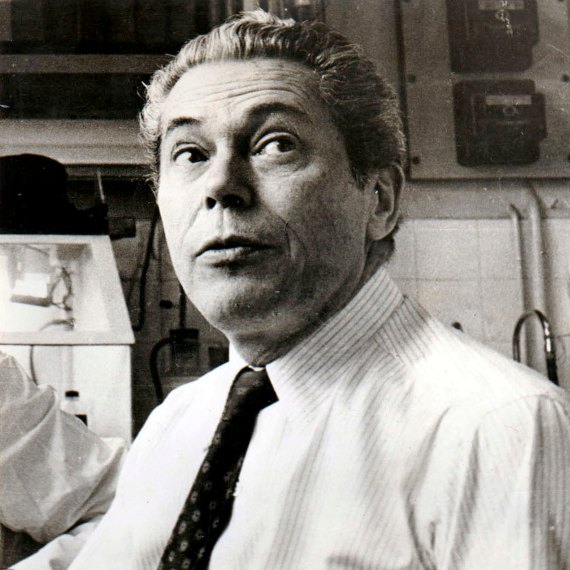Jacques Monod was many things throughout his life: aspiring orchestra conductor, hero of the French Resistance, scourge of Soviet pseudo-science that wanted to dismantle Darwin, contact person for persecuted scientists on the other side of the Iron Curtain, and successful writer who postulated the hypothesis of the Earth being the only possible origin for life. But, above all, he was one of the founders of molecular biology and the discoverer of the mechanism for regulating gene expression, an achievement for which he won the 1965 Nobel Prize for Medicine.
Chance: Unforeseen misfortune
In 1936, Jacques Lucien Monod (9 February 1910 – 31 May 1976) was about to embark on a scientific expedition to Greenland when one of his colleagues from the faculty of natural sciences at the Sorbonne, Boris Ephrussi, convinced him to accompany him to the California Institute of Technology (Caltech) in the USA to study genetics on a Rockefeller scholarship. That decision saved his life, as the ship on which he was to travel with the expedition sank and there were no survivors.

Despite the fact that in California he spent most of his time “fooling around” and displaying and exploiting his French Riviera playboy charms, as well as his musical talent —as he himself would later confess— his stay at Caltech convinced him that genetics was the key to achieving his student dream of explaining how living things work.
Necessity: That which is impossible to avoid
When World War II broke out, Monod felt the need to join the French army, and when the Germans invaded France, he didn’t hesitate to join the Resistance. Monod was soon a member of one of the most militarized groups, Les Franc-tireurs, first under the alias of “Marchal” and then as commander “Malivert”. The head of the Pasteur Institute, André Lwoff, who was also a member of the Resistance, offered him refuge and work in the laboratories of the institution. Monod thus began to lead a double life: by day, he was a researcher working on his experiments, and by night, a leader of the Resistance. He took on increasing responsibilities and would eventually be in charge of many of the operations that prepared the Normandy Landing. For all this, at the end of the war he was distinguished with the highest military honours.
With the war over, Jacques Monod devoted himself to his research at the Pasteur Institute, where he established a fruitful collaboration with another war hero, François Jacob. In 1959, with the help of Arthur Pardee, they conducted one of the most famous experiments in the history of modern science: the “PaJaMo“, which allowed them to discover the existence of genes regulating the expression of proteins, using a control mechanism (the “Operon Model”).
 Representation of the operon model. Source: Free_SvG
Representation of the operon model. Source: Free_SvG
The key to this model was a repressor molecule that can bind to DNA, and whose presence or absence —determined by a regulatory gene— blocks or allows the production of a protein. It is one of the basic mechanisms for life, and in fact this functioning is common to the cells of all living beings.
Despite the success of their experiment, Monod and his colleagues did not actually obtain any direct evidence of the existence of this repressor, but deduced it as the only logical explanation. Nevertheless, their explanation was so compelling that they received the Nobel Prize for it in 1965, a year before other researchers isolated a repressor molecule, finally confirming their model.
Chance: Coincidence, a fortuitous thing. Necessity: An irresistible impulse that makes causes work in a certain way.
In the final years of his career, Jacques Monod published his book Chance and Necessity (1970), in which he divulged advances and theories of modern molecular biology. The book was very well received and has become a reference text.
The book also presented his hypothesis on the origin of life on Earth. For Monod, life emerged by pure chance, the consequence of a convergence of chemical elements and propitious conditions (the primordial soup), so improbable that one could say with assurance that it could only have occurred on Earth. But once the first amino acids were formed, the evolution of life into increasingly complex entities and organisms was an inevitable consequence. A necessity.
Comments on this publication